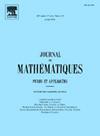Existence and stability of almost finite energy weak solutions to the quantum Euler-Maxwell system
IF 2.3
1区 数学
Q1 MATHEMATICS
引用次数: 0
Abstract
In this paper we prove the existence of global in time, finite energy weak solutions to the quantum magnetohydrodynamics (QMHD) system, for a large class of initial data that are slightly more regular than being of finite energy. No restriction is given on their size or the uniform positivity of the mass density. The QMHD system is a well-established model in superconductivity due to Feynman, and is intimately related to a nonlinear Maxwell-Schrödinger (NLMS) system via the Madelung transformations. The lack of global well-posedness (GWP) results for the NLMS system in the energy norm provides an obstruction to stability of its solutions, and consequently to the use of approximation arguments to make rigorous the Madelung approach. We implement here a new strategy, that derives weak solutions to QMHD starting from weak solutions to NLMS, by exploiting its Duhamel formulation. This derivation is rigorously justified by means of suitable dispersive/smoothing estimates for almost finite energy weak solutions to NLMS. The corresponding weak solutions to QMHD satisfy a generalized irrotationality condition, that allows for the presence of non-trivial vorticity (e.g., vortex filaments) concentrated in the vacuum region. This is in sharp contrast with the Euler-Maxwell system where the dispersion is not able to deal with the vorticity transport, therefore almost GWP (for regular solutions that are small perturbations of constant states) holds only in a lifespan, reciprocal of the size of the initial vorticity. Moreover, we also prove a stability property in the energy norm of the weak solutions constructed by our approach. This result follows from new local smoothing estimates for NLMS that are also of independent interest. As a byproduct, we also show the stability for the electromagnetic Lorentz force.
量子欧拉-麦克斯韦系统的几乎有限能量弱解的存在性和稳定性
在本文中,我们证明了量子磁流体力学(QMHD)系统在一大类比有限能量更有规律的初始数据中存在全局时间有限能量弱解。对它们的大小或质量密度的均匀正向性不做限制。QMHD 系统是费曼提出的一个成熟的超导模型,通过马德隆变换与非线性麦克斯韦-薛定谔(NLMS)系统密切相关。NLMS 系统在能量规范中缺乏全局好求解(GWP)结果,这阻碍了其解的稳定性,进而阻碍了使用近似论据使马德隆方法变得严谨。在这里,我们采用了一种新策略,即利用 NLMS 的杜哈梅尔公式,从 NLMS 的弱解出发,推导出 QMHD 的弱解。通过对几乎有限能量的 NLMS 弱解进行适当的色散/平滑估计,这一推导得到了严格的证明。QMHD 的相应弱解满足广义旋回性条件,允许存在集中在真空区域的非三维涡度(例如涡丝)。这与欧拉-麦克斯韦(Euler-Maxwell)系统形成了鲜明对比,后者的色散无法处理涡度传输,因此几乎 GWP(对于恒定状态的小扰动的正则解)只在初始涡度大小的倒数范围内成立。此外,我们还证明了用我们的方法构建的弱解的能量规范稳定性。这一结果源于对 NLMS 的新局部平滑估计,这也是我们感兴趣的地方。作为副产品,我们还证明了电磁洛伦兹力的稳定性。
本文章由计算机程序翻译,如有差异,请以英文原文为准。
求助全文
约1分钟内获得全文
求助全文
来源期刊
CiteScore
4.30
自引率
0.00%
发文量
84
审稿时长
6 months
期刊介绍:
Published from 1836 by the leading French mathematicians, the Journal des Mathématiques Pures et Appliquées is the second oldest international mathematical journal in the world. It was founded by Joseph Liouville and published continuously by leading French Mathematicians - among the latest: Jean Leray, Jacques-Louis Lions, Paul Malliavin and presently Pierre-Louis Lions.

 求助内容:
求助内容: 应助结果提醒方式:
应助结果提醒方式:


